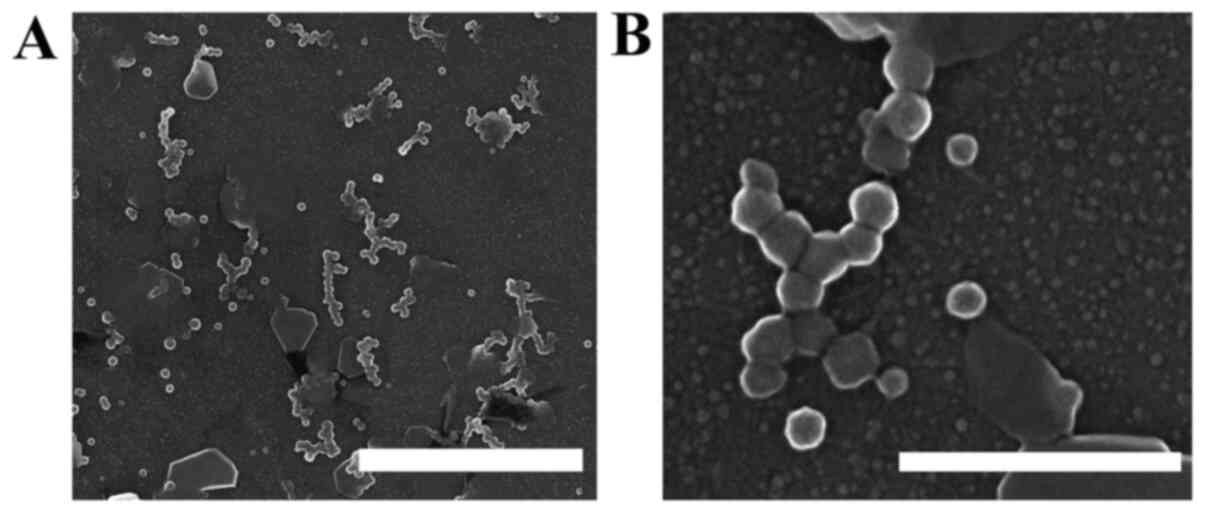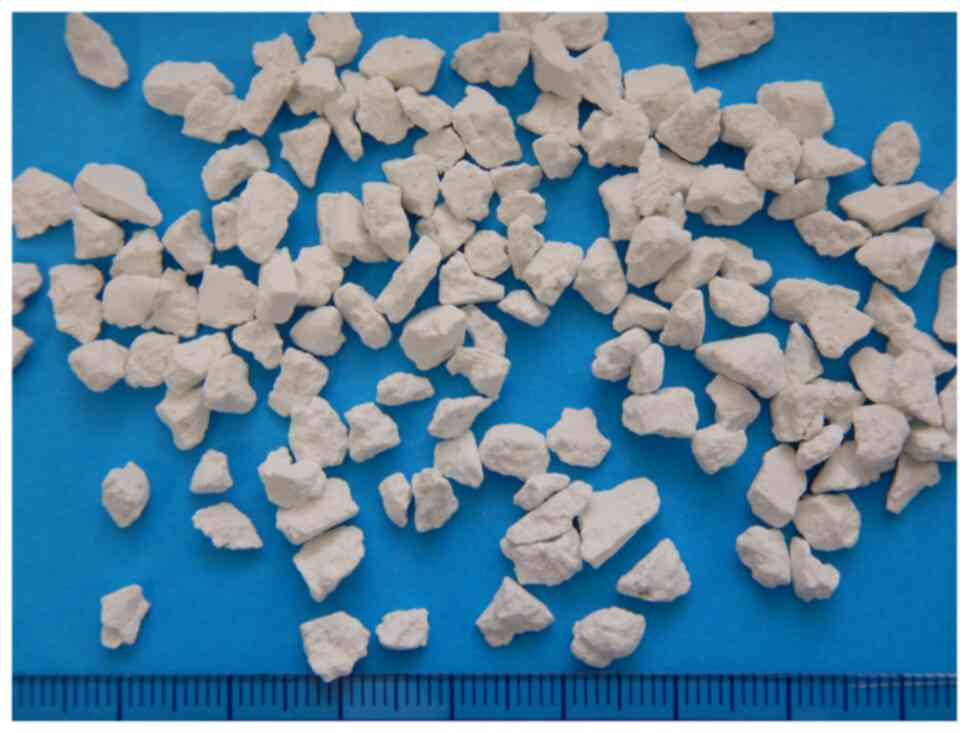|
1
|
Nakashima R, Kawamoto M, Miyazaki S,
Onishi R, Furusaki K, Osaki M, Kirisawa R, Sakudo A and Onodera T:
Evaluation of calcium hydrogen carbonate mesoscopic crystals as a
disinfectant for influenza A viruses. J Vet Med Sci. 79:939–942.
2017.PubMed/NCBI View Article : Google Scholar
|
|
2
|
Sakudo A, Iwamaru Y, Furusaki K, Haritani
M, Onishi R, Imamura M, Yokoyama T, Yoshikawa Y and Onodera T:
Inactivation of scrapie prions by the electrically charged
disinfectant CAC-717. Pathogens. 9(536)2020.PubMed/NCBI View Article : Google Scholar
|
|
3
|
Kampf G, Todt D, Pfaender S and Steinmann
E: Persistence of coronaviruses on inanimate surfaces and their
inactivation with biocidal agents. J Hosp Infect. 104:246–251.
2020.PubMed/NCBI View Article : Google Scholar
|
|
4
|
Wilson JR, Mills JG, Prather ID and
Dimitrijevich SD: A toxicity index of skin and wound cleansers used
on in vitro fibroblasts and keratinocytes. Adv Skin Wound Care.
18:373–378. 2005.PubMed/NCBI View Article : Google Scholar
|
|
5
|
McCauley RL, Linares HA, Pelligrini V,
Herndon DN, Robson MC and Heggers JP: In vitro toxicity of topical
antimicrobial agents to human fibroblasts. J Surg Res. 46:267–274.
1989.PubMed/NCBI View Article : Google Scholar
|
|
6
|
Kinoda J, Ishihara M, Hattori H, Nakamura
S, Fukuda K and Yokoe H: Cytotoxicity of silver nanoparticle and
chitin-nanofiber sheet composites caused by oxidative stress.
Naonmaterials (Basel). 6(189)2016.PubMed/NCBI View Article : Google Scholar
|
|
7
|
Ishihara M, Hata Y, Hiruma S, Takayama T,
Nakamura S, Sato Y, Ando N, Fukuda K, Murakami K and Yokoe H:
Safety of concentrated bioshell calcium oxide water application for
surface and skin disinfections against pathogenic microbes.
Molecules. 25(4502)2020.PubMed/NCBI View Article : Google Scholar
|
|
8
|
Percival GC and Haynes I: The influence of
calcium sprays to reduce fungicide inputs against apple scab
[Venturia inaequalis (Cook) G. Wint.]. Arboric Urban For.
35:263–270. 2009.
|
|
9
|
Ly KA, Milgrom P and Rothen M: The
potential of dental-protective chewing gum in oral health
interventions. J Am Dent Assoc. 139:553–563. 2008.PubMed/NCBI View Article : Google Scholar
|
|
10
|
Grassi M, Fraioli A, Pappalardo G, Messina
B, Belardinelli L and Guadalaxara A: Alkalizing activity of a
calcium-bicarbonate-containing water, evaluated for pH, in patients
with gastroesophageal reflux. Clin Ter. 143:131–136.
1993.PubMed/NCBI(In Italian).
|
|
11
|
Shimakura H, Gen-Nagata F, Haritani M,
Furusaki K, Kato Y, Yamashita-Kawanishi N, Le DT, Tsuzuki M, Tohya
Y, Kyuwa S, et al: Inactivation of human norovirus and its
surrogate by the disinfectant consisting of calcium hydrogen
carbonate mesoscopic crystals. FEMS Microbiol Lett.
366(fnz235)2019.PubMed/NCBI View Article : Google Scholar
|
|
12
|
van Beek J, de Graaf M, Al-Hello H, Allen
DJ, Ambert-Balay K, Botteldoorn N, Brytting M, Buesa J, Cabrerizo
M, Chan M, et al: Molecular surveillance of norovirus, 2005-16: An
epidemiological analysis of data collected from the NoroNet
network. Lancet Infect Dis. 18:545–553. 2018.PubMed/NCBI View Article : Google Scholar
|
|
13
|
Sakudo A, Yamashiro R, Haritani M,
Furusaki K, Onishi R and Onodera T: Inactivation of non-enveloped
viruses and bacteria by an electrically charged disinfectant
containing meso-structure nanoparticles via modification of the
genome. Int J Nanomedicine. 15:1387–1395. 2020.PubMed/NCBI View Article : Google Scholar
|
|
14
|
Sakudo A, Haritani M, Furusaki K, Onishi R
and Onodera T: Electrically charged disinfectant containing calcium
hydrogen carbonate mesoscopic crystals as a potential measure to
control Xanthomonas campestris pv. campestris on
cabbage seeds. Microorganisms. 8(1606)2020.PubMed/NCBI View Article : Google Scholar
|
|
15
|
Williams PH: Black rot: A continuing
threat to world crucifiers. Plant Dis. 64:736–742. 1980.
|
|
16
|
Hines JD, McKelvey PJ and Bodnaruk PW:
Inappropriate use of D-values for determining biocidal activity of
various antimicrobials. J Food Sci. 76:M8–M11. 2011.PubMed/NCBI View Article : Google Scholar
|
|
17
|
Matsuura Y, Ishikawa Y, Murayama Y,
Yokoyama T, Somerville RA, Kitamoto T and Mohri S: Eliminating
transmissibility of bovine spongiform encephalopathy by dry-heat
treatment. J Gen Virol. 101:136–142. 2020.PubMed/NCBI View Article : Google Scholar
|
|
18
|
Onodera T, Ikeda T, Muramatsu Y and
Shinagawa M: Isolation of scrapie agent from the placenta of sheep
with natural scrapie in Japan. Microbiol Immunol. 37:311–316.
1993.PubMed/NCBI View Article : Google Scholar
|
|
19
|
Giaccone G and Moda F: PMCA applications
for prion detection in peripheral tissues of patients with variant
Creutzfeldt-Jakob disease. Biomolecules. 10(405)2020.PubMed/NCBI View Article : Google Scholar
|
|
20
|
Hughson AG, Race B, Kraus A, Sangare LR,
Robins L, Groveman BR, Saijo E, Phillips K, Contreras L, Dhaliwal
V, et al: Inactivation of prions and amyloid seeds with
hypochlorous acid. PLoS Pathog. 12(e1005914)2016.PubMed/NCBI View Article : Google Scholar
|
|
21
|
Yokoyama T, Nishimura T, Uwamono Y, Kosaki
K, Frusaki K, Onishi R, Onodera T, Haritani M, Sugiura K, Kirisawa
R and Hasegawa A: Virucidal effect of the mesoscopic structure of
CAC-717 against severe acute respiratory syndrome coronavirus 2
(SARS-CoV-2). Microorganisms. 9(2096)2021.PubMed/NCBI View Article : Google Scholar
|
|
22
|
Kirisawa R, Kato R, Furusaki K and Onodera
T: Universal activity of calcium biocarbonate mesoscopic crystals
that provides an effective and biosafe disinfectant.
Microorganisms. 10(262)2022.PubMed/NCBI View Article : Google Scholar
|
|
23
|
Ishihara M, Murakami K, Fukuda K, Nakamura
S, Kuwabara M, Hattori H, Fujita M, Kiyosawa T and Yokoe H:
Stability of weakly acidic hypochlorous acid solution with
microbicidal activity. Biocontrol Sci. 22:223–227. 2017.PubMed/NCBI View Article : Google Scholar
|
|
24
|
Hatanaka N, Yasugi M, Sato T, Mukamoto M
and Yamazaki S: Hypoclorous acid solution is a potent antiviral
agent against SARS-CoV-2. J Appl Microbiol. 132:1496–1502.
2022.PubMed/NCBI View Article : Google Scholar
|
|
25
|
Nakamura S, Ishihara M, Sato Y, Takayama
T, Hiruma S, Ando N, Fukuda K, Murakami K and Yokoe H: Concentrated
bioshell calcium oxide (BiSCaO) water kills pathogenic microbes:
Characterization and activity. Molecules. 25(3001)2020.PubMed/NCBI View Article : Google Scholar
|
|
26
|
Yan P, Daliri EB and Oh DH: New clinical
applications of electrolyzed water: A review. Microorganisms.
9(136)2021.PubMed/NCBI View Article : Google Scholar
|
|
27
|
Murakami S, Kitamura T, Suzuki J, Sato R,
Aoi T, Fujii M, Matsugo H, Kamiki H, Ishida H, Takenaka-Uema A, et
al: Detection and characterization of bat sabecovirus
phylogenetically related to SARS-CoV-2, Japan. Emerg Infect Dis.
26:3025–3029. 2020.PubMed/NCBI View Article : Google Scholar
|
|
28
|
Haramoto E, Malla B, Thakali O and
Kitajima M: First environmental surveillance for the presence of
SARS-CoV-2 RNA in wastewater and river water in Japan. Sci Total
Environ. 737(140405)2020.PubMed/NCBI View Article : Google Scholar
|
|
29
|
Boyce JM: Modern technologies for
improving cleaning and disinfection of environmental surfaces in
hospitals. Antimicrob Resist Infect Control. 5(10)2016.PubMed/NCBI View Article : Google Scholar
|
|
30
|
Samara F, Badran R and Dalibalta S: Are
disinfectants for the prevention and control of COVID-19 safe?
Health Secur. 18:496–498. 2020.PubMed/NCBI View Article : Google Scholar
|
|
31
|
Petrillo F, Chianese A, De Bernado M,
Zannella C, Galdiero M, Reibaldi M, Avitabile T, Boccia G, Galdiero
M, Rosa N and Franci G: Inhibitory effect of ophthalmic solutions
against SARS-CoV-2: A preventive action to block the viral
transmission? Microorganisms. 9(1550)2021.PubMed/NCBI View Article : Google Scholar
|


















